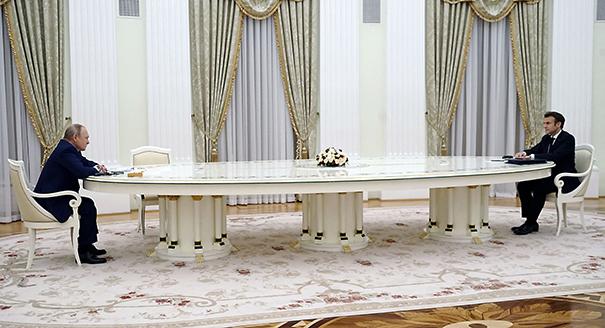Dmitri Trenin is director of the Carnegie Moscow Center. He is the author, most recently, of What is Russia Up To In the Middle East? published in December 2017 by Polity. Before joining Carnegie in 1994, he served in the Russian military and graduated in 1977 from the Military Institute of the Ministry of Defense of the USSR. In 1984, Trenin received a Ph.D. in history from the Institute of U.S. and Canadian Studies of the Soviet Academy of Sciences. Diwan interviewed Trenin in early February to get his perspective on how the crisis in Ukraine is being perceived in the Middle East.
Michael Young: The Arab world has watched the crisis in Ukraine very closely. What do you anticipate will be the main issues Arab regimes will be looking at?
Dmitri Trenin: I think the outside world, including Arab countries, will be watching U.S. and Russian moves in this conflict, and the U.S.-Russian interaction over Ukraine. One takeaway they might have is the unwillingness of the United States to fight to defend its partner state, Ukraine. This means that U.S. security guarantees—for example, by means of NATO accession—cannot be given against a real threat of military collision with the other nuclear superpower. Another takeaway is that China for the first time is taking a position on European security issues. And this position is in support of Russian security concerns (though not necessarily of Moscow’s specific actions). Reciprocal Russian-Chinese backing globally with regard to the United States is thus becoming a new norm.
MY: What do you think will be of specific relevance to Iran in the Ukraine crisis? And how might this play into the ongoing negotiations taking place in Vienna over reviving the nuclear deal with Tehran?
DT: Throughout the security crisis in Europe, Russia has been working hard toward an agreement on the Iranian nuclear program. Moscow’s position on nonproliferation has been consistent since the start of the U.S.-Russian confrontation in 2014.
MY: Russian assertiveness is likely to lead to a reassessment in Europe of how to access energy. What changes do you anticipate when it comes to pipeline politics, especially with regard to the Middle East? And is it realistic to assume, in light of the Ukraine crisis, that European countries can go back to the status quo ante on the Nord Stream pipeline?
DT: Canceling the Nord Stream 2 pipeline, which is not yet online, and more broadly undermining the European Union-Russia energy relationship in order to reduce or end Europe’s dependency on Russian gas, has been a key objective of many people in the United States and Europe. The Biden administration’s current relatively restrained position on Nord Stream 2 is part of a deal between Washington and Berlin. As the crisis with Russia unfolds, one can see that position hardening. The United States is looking for ways to compensate elsewhere—for example, Qatar—for a possible suspension of Russian gas deliveries. So far, Germany had been holding out, as any replacement of Russian gas would cost substantially more, making German industrial output less competitive. Yet, the recent visit to Moscow by the new German chancellor, Olaf Scholz, does not bode too well for the future of Russia-German relations.
MY: What is taking place today in Ukraine appears to be a Russian backlash to a post-Cold War tendency of the United States, and perhaps the West, to take Russia for granted—whether in the former Yugoslavia, particularly Kosovo, or in Iraq and Libya. Russia’s first serious pushback against this tendency outside the borders of the former Soviet Union, I believe, came in the Middle East—in Syria. How far is Russia willing to go in the region to further reassert its status as a major power that Washington cannot circumvent?
DT: I don’t think Russia will seek to expand its military footprint in the Middle East in order to further reassert itself as a world power. Russia is cultivating ties with most countries in the Middle East and North Africa, and is prepared to go as far as it makes sense to do so in terms of Russian interests. Beyond that, Russia is busy reaching out to a number of non-Western countries, from Africa to Asia to Latin America, in order to expand its reach, win new partners, and compensate for the worsening relations with the United States and its allies.
MY: There was much commentary, and criticism, after French President Emmanuel Macron’s recent visit to Moscow about the possibility of the “Finlandization” of Ukraine. In the Middle East, implicit “Finlandizations” exist throughout the region, as small states avoid opposing the interests of stronger neighbors. Do you feel that the notion of Finlandization must be part of any solution in Ukraine?
DT: I would avoid the term “Finlandization,” out of respect for my Finnish friends, who feel slighted by it. Instead, I would simply look at the real geopolitical and strategic situation of Ukraine. It has been made clear by none other than U.S. President Joe Biden that the United States will not defend Ukraine, even in the case of a major invasion and occupation. This means that Ukraine will never be admitted to NATO by Washington for as long as Russia would regard this as a casus belli. Ukrainians would indeed need to think hard about what to do if they cannot rely on U.S. security guarantees.






